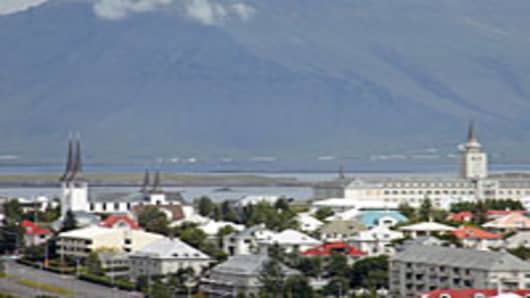A Chinese tycoon plans to buy a vast tract of Icelandic land for a $100 million tourism project which critics fear could give Beijing a strategic foothold in the North Atlantic.
Huang Nubo, a real estate investor and former Chinese government official, has struck a provisional deal to acquire 300 square kilometres of wilderness in north-east Iceland where he plans to build an eco-tourism resort and golf course.
Opponents have questioned why such a large amount of land — equal to about 0.3 percent of Iceland’s total area — is needed to build a hotel. They warned that the project could provide cover for China’s geopolitical interests in the Atlantic island nation and Nato member.
While home to just 320,000 people, Iceland occupies a strategically important location between Europe and North America and has been touted as a potential hub for Asian cargo should climate change open Arctic waters to shipping.
The deal has been agreed with private landowners but must still be approved by the Icelandic government, which owns part of the land, which is known as Grímsstadir á Fjöllum.
Ögmundur Jónasson, the Icelandic interior minister, who would be responsible for the decision, signalled concern over the plan. “China has been very active in buying up land around the world so we need to be aware of the international ramifications,” he told the Financial Times.
In addition to its proximity to potential deepwater ports, the land also includes one of Iceland’s biggest glacial rivers.
Mr Huang, who previously worked at China’s Central Propaganda Department and the Ministry of Construction, has sought to reassure Icelanders over his intentions by pledging to renounce all rights to water running through the land.
People familiar with the deal said that Mr Huang had agreed to pay almost IKr1 billion ($8.8 million) for the land and planned to invest IKr10 billion-IKr20 billion in the tourism project.
The Icelandic foreign ministry said it “welcomed foreign investment and strengthening of tourism,” but cautioned that a thorough study would be needed before the project could go ahead. Reykjavik is keen for inward investment as it battles to recover from its 2008 banking crisis.
Mr Huang is ranked by Forbes as China’s 161st richest man, with a net worth of $890 million. His company, Zhongkun Group, owns resorts and tourist facilities across China. He describes himself as a poet and adventurer, having climbed Mount Everest and reached the north and south poles.
People close to him say his interest in Iceland is motivated by his love of nature rather than geopolitics.
Mr Huang has had ties with Iceland since sharing a room with an Icelandic student, Hjorleifur Sveinbjornsson, at Peking University during the 1970s. Mr Sveinbjornsson, whose wife is a former Icelandic foreign minister and Reykjavik mayor, is acting as Mr Huang’s informal representative in Iceland.
China last year agreed a $500 million currency swap deal with Iceland which was widely viewed as a sign of Beijing’s desire to build links with Reykjavik. The two countries are already discussing co-operation on Arctic shipping as part of Beijing’s broader interest in the potential to ship goods to Europe and the US east coast across the North Pole as Arctic ice recedes.
The land that Mr Huang intends to buy is in the vicinity of a deepwater port, although the land itself does not include any coastline, according to a person familiar with the deal.


